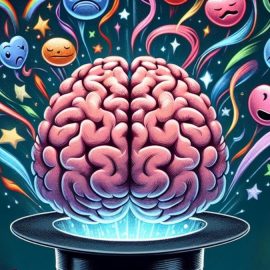

This article is an excerpt from the Shortform book guide to "The Law of Success" by Napoleon Hill. Shortform has the world's best summaries and analyses of books you should be reading.
Like this article? Sign up for a free trial here.
How does your subconscious mind influence your behavior? How can you program your subconscious mind to work in your favor?
Your subconscious mind determines your life outcomes in that it attracts experiences that correspond to its contents. For example, if you always think about how lonely you are, you will imprint this sentiment on your subconscious mind, and this will prompt you to act in ways that reinforce your loneliness.
Keep reading to learn about the psychology of the subconscious mind and how you can train your subconscious to produce goal-oriented behavior.
Your Habitual Conscious Thoughts Train Your Subconscious Mind
Hill argues that your conscious thoughts leave an impression on your subconscious mind, and the more often you think certain thoughts (the more habitual they are), the heavier the impression they leave. This impression trains your subconscious mind to form conclusions about who you are and what’s important to you—your personality traits and your deepest desires, fears, and beliefs. Your subconscious mind then influences you to automatically think and behave in ways that reflect and reinforce those conclusions.
(Shortform note: There’s still much to learn about the psychology of the subconscious mind, but even in 1928, Hill was right about its importance—neuroscientists have since found that 95% of your brain activity takes place beyond your conscious awareness, in your subconscious mind. Further, research reveals that your subconscious mind makes decisions about how to feel or act before your conscious mind even perceives the need to make a decision—thus supporting Hill’s argument that your subconscious mind influences you to automatically think and behave in specific ways.)
Example #1: You habitually think about how lonely you are and you imprint this sentiment upon your subconscious mind. Your subconscious mind concludes that you are lonely. As a result, each time you’re around people, your subconscious mind influences you to think and behave in ways that reinforce your loneliness—for instance, by making you feel socially anxious or urging you to push people away.
Example #2: You habitually think about how difficult it is to complete a certain task and you imprint this sentiment upon your subconscious mind. Your subconscious mind concludes, “This task is difficult.” As a result, each time you’re faced with this task, your subconscious mind influences you to think and behave in ways that reinforce the belief that it’s difficult—for instance, by making you feel overwhelmed or tempting you to procrastinate.
| Why Your Subconscious Mind Forms Conclusions About You Neuroscientists offer additional insights on why your subconscious mind uses your habitual thoughts to form conclusions about you: It prevents information overload and helps you make quick decisions. Your subconscious mind is an unlimited memory bank that permanently stores your every life experience, even those you’re not consciously aware of: Everything you experience is imprinted in this area of your brain. This memory bank processes four billion bits (a measure of data transfer) per second and includes both significant and insignificant experiences, such as how you felt the first time you fell in love and the many hours you’ve spent playing solitaire. To function efficiently, your conscious mind accesses the information stored in this memory bank on a moment-to-moment basis. Since this memory bank is so full of information, your subconscious mind relies on your habitual conscious thoughts to create shortcuts (conclusions) to quickly sift through everything it has stored, retrieve the information you need, and influence you to act accordingly. For example, when it’s time to fill out your quarterly tax return, you automatically look for ways to procrastinate. The process that leads to your procrastination plays out as follows: You look at the tax forms. Your subconscious mind sifts through its memory bank, retrieves memories of your previous tax-related experiences (they were all arduous experiences), decides on an appropriate response (that you’d rather not repeat those experiences), and compels you to procrastinate. What feels like a conscious, active response to you is actually a pre-programmed response based on how you habitually think and behave. |

———End of Preview———
Like what you just read? Read the rest of the world's best book summary and analysis of Napoleon Hill's "The Law of Success" at Shortform.
Here's what you'll find in our full The Law of Success summary:
- How your subconscious mind creates your life experiences
- Why the only way to achieve success is to realign your habitual thoughts
- Actionable advice on how to retrain your subconsciousmind for success






